To read this issue in your browser, click on the headline above.
On Facebook I posted this tweet —

— and asked for other random acts of thrift people practice. They seem particularly relevant now that more of us are pinching pennies and hugging nickles a bit tighter as prices rise (our $350 grocery bill the other day was the highest I can remember).
I put the 10 most common or interesting responses in a click poll so I can rank them for Thursday’s issue. Follow the link and tell me which if any of these you can identify with.
I rinse out and reuse zip-close plastic bags.
I save napkins and seasoning packets from restaurant carry out/delivery.
I bring home the unused portion of hotel shampoo and conditioner bottles.
I cut tubes of toothpaste and lotion when they're almost empty so I can scrape out what’s left.
I reuse sheets of aluminum foil.
I wash and reuse disposable plastic cutlery and cups.
I rescue gift wrapping paper that's not too badly torn and use it again on another occasion.
I save lightly used napkins and paper towels in order to use them when I next have to blow my nose.
I add water to dish and laundry soap bottles when they appear to be empty and get one more use out of them.
I save the plastic bags that bread comes in and reuse them as Baggies.
Here are a few that didn’t make the poll:
I hang used paper towels out to dry and use again.
When the guitar strings are getting dull, I take them off and boil them for a few minutes. Dry, and put them back on the guitar.
I use empty cereal bags for food storage in the fridge & freezer.
I use a bar of soap until it's about the diameter and thickness of a Kennedy half-dollar. Then I put all the leftovers in a Solo cup and press down, squeeze the liquid out and let it dry. After a while, I have a nice, large bar of soap available.
I put oil and vinegar into almost- empty mustard jars to get the last of it, and make salad dressing.
I use a small scoopy spatula to get every last smidge of peanut butter out of the jar.
I refill travel-size toothpaste tubes by putting them spout to spout with a larger tube and squeezing.
I rip paper towels in half.
Eat your heart out, Hints from Heloise.
CNN+ is reportedly failing. Good.
Cards on the table, I like CNN. I tend to watch it only during moments of national or international crisis — at the start of Russia’s invasion of Ukraine I had it on a lot — when it provides the best up-to-the-minute coverage — but I’m glad it’s there.
Yet I was not the least bit tempted by the subscription come-ons from CNN+, the new streaming service that launched March 29:
CNN, a division of AT&T's WarnerMedia, invested a reported $120 million in CNN+ and recruited top talent, including Fox News veteran Chris Wallace, actress Eva Longoria, and Alison Roman, a former New York Times food writer fired by bosses at the paper for criticizing shamed social media star Chrissy Teigen. CNN+ features live daily news programming, original series, true crime shows and food and travel docuseries. (Daily Mail)
I hit peak streaming service a while ago, and the idea of one more monthly charge on top of Hulu, Netflix, Prime Video, HBO Max, Peacock and Apple TV+ along with our Dish Network service is not appealing. If anything we’re about to start rotating our subscriptions, cancelling and re-upping depending on which shows we want to binge.
I guess I’m not alone:
Is CNN+ Already a Bust? (Motley Fool)
Big cuts coming for CNN+ after slow start (Axios)
CNN+ struggles to lure viewers in its early days, drawing fewer than 10,000 daily users (CNBC)
I’m not opposed to innovation and experimentation, but where did CNN see the demand for more of what they have to offer? If Axios is correct that big cuts are coming to the service, I suggest the market research team be first on the chopping block.
Notes and comments from readers —lightly edited —- along with my responses
Some of these messages are in reference to items in last Thursday’s Picayune Sentinel.
Pete Z. — Regarding the Oak Park church “fasting from whiteness” during Lent and your admission to having white privilege: Your privilege is made of a number of elements besides being white. You are middle class and you reside in an area where your views are accepted. Just being white does not provide all the privileges you have been gorging on.
Yes. And I am a cisgender, heterosexual male. And I have no notable disabilities and have always been in good long-term health. When I write of “privilege” I’m referring to unearned advantages — the religious term “blessings” feels like a more loaded term as it implies negative judgments on those without those advantages.
But let’s be honest. Being born a straight, white, healthy male to educated, middle-income, happily married parents put me several rungs up on life’s ladder on day one. Growing to 6 feet 4 inches didn’t hurt, either. I can’t claim any credit for that, nor do I feel guilt about the cultural context that confers those advantages.
I am, however, aware of them — all of them — and not resentful of those who point them out to me and who remind me that it’s incumbent of those with these advantages to help reframe the cultural context in order to spread them around.
Marc M. — I am a 67-year-old American with Mexican heritage (mestizo), I am not a “brown person.” “Brown person” is a condescending and derogatory phrase. And I do not agree that white privilege exists or is useful as a concept. It does nothing to elucidate or frame actual areas needing attention. Most of your advantages in life came from your parents. This includes a large part of your sense of place, self-assurance, and confidence. Also, your educational and professional success. You may be surprised to learn that such parents also exist in minority communities, although white privilege assumes that they do not. For me, the “daily stings of prejudice” were trivial and irrelevant, I ignored them. I also avoided all affirmative action programs because they assumed that I was needy and less capable.
So you don’t agree that coding as “white” has long conferred certain advantages in our society? When it comes to, say, hailing a cab, shopping at a high-end store, interacting with police officers and so on? When it comes to assumptions made about you and prejudices carried by others … none of those are disadvantageous and we have realized Martin Luther King’s dream of a colorblind society?
I don’t. As noted above, I think of it as one of a group of advantages that certain people have. My observation is that prejudices are hard-wired into us and while most of us make a good faith effort to overcome that, its effects are still plainly felt by many. I admit that I can’t speak to this first hand, but I think that examining and understanding the way others may not have the inherent advantages and opportunities that you do is a useful thought process.
The seething resentment with which this observation is greeted by many puzzles me. It seems to come from a belief by some they earned and therefore deserve all the advantages they have, and any suggestion otherwise is a demand for guilt feelings and literal reparations.
As for the term “brown people” it seems to me that it comes from and has been sanctioned by those in “communities of color,” if you will, as a way to identify those of Central and South American heritage. I am always happy to refer to groups of people using the terms they prefer, but I’m not persuaded by your lone objection that the term is generally considered “condescending and derogatory.”
Thomas B. — I often attend CSO concerts. Their programs usually consist of one very popular piece of music everyone buys a ticket to hear. And a couple of other pieces I’ve never heard of. While I usually don’t enjoy those unfamiliar pieces of music, I’m glad my mind was opened to something I’m not familiar with. So the problem with “fasting from whiteness” isn’t the introduction of unfamiliar music. It’s that the church’s use of those words will be weaponized by Republicans leading to the destruction of Democrats at the polls this fall and in 2024. Republicans are so much better at messaging than Democrats.
Those on the far edges of the political spectrum are believers in strong, confrontational, paradigm-shifting slogans, from “abortion is murder” to “abolish the police.” The idea seems to be to provoke those in the middle who might reject the absolutist formulation to at least come part of the way there.
“Abortion is murder” becomes “No, but, OK, well, then, let’s acknowledge that the embryo/fetus is not merely a morally neutral clump of tissue.”
“Abolish the police” becomes “No, but, OK, well, then, let’s rethink and restructure policing because there are problems with it.”
Unless such slogans become, “No, your side is zealous, extreme and therefore contemptible and not to be trusted.”
And I fear that’s where we are with “fasting from whiteness.” Sure, those who believe anti-racism is the cause of our time and should be centered in our thinking and in public policy will be energized by it. But they are a political minority already highly inclined to vote Democratic. The feedback I’ve gotten and seen online suggests that the sort of moderate, open-minded but not radicalized voters who can go either way at election time are turned off by such muscular messaging.
But then again, how many people really are in the middle anymore? If pungent slogans inspire your base to turn out, is that the better political strategy?
Laura E. — The church could have simply said, "This Lenten season, we honor the music of black, indigenous and people of color" and leave it at that. Instead, the church generates a racial clash by stating, "FU Whitey" albeit in nicer language. What do they think some people will take away from this? And are those "some people" not worthy of feeling insulted because they are something to fast from? I mean really, there are so many better ways to put the message across. But no, let's fan the flames.
I think you’re reading “FU Whitey” into an initiative that’s designed to foster inclusion and a broadening of the church’s cultural horizons. If this were a permanent renunciation of white composers rather than a 40 day experiment, I’d be somewhat inclined to understand “fasting from whiteness” as an insult rather than simply an aggressive, implicitly challenging slogan.
Phillip S. — Regarding your enthusiasm for ranked-choice voting, I always think back to the victory of Harold Washington over incumbent Mayor Jane Byrne and Richard M. Daley in Chicago’s 1983 Democratic mayoral primary. You can bet that with ranked-choice voting that would never have happened. Ranked-choice not only makes it harder for fringe candidates to win, but harder for any minority candidate.
In general I don't think it's a bad thing for "fringe" candidates to stay on the fringes, and I'm not at all sure that RCV disadvantages racial minorities. My guiding principle is that our elected officials should represent the consensus sentiments of a majority of the electorate ,and that RCV— also called "instant runoff" — is ,in the long run, the superior method of installing leaders.
Interestingly, RCV along with open (non-partisan) primary elections) is one of the anti-polarization initiatives backed by
Rick W. — Anybody who thinks it would be a great idea to just have the feds do their taxes has never gotten audited.
I'm suggesting that the IRS is in position to create and maintain a Turbo Tax-like program free to all filers and giving online access to all forms, and that it's insane that so many of us have to pay so much to do what in many cases is fairly simple paperwork. Other countries do it, and any concerns about the IRS not being an honest adviser could be overcome by putting an independent panel in charge of oversight of the software.
Ya gotta see these tweets!
I often run across tweets that are too visual in nature to include in the Tweet of the Week contest (the template for the poll does not allow the use of images). Here are a few good ones I’ve come across recently:
I don’t expect that @Bec2Yeg originated this image but I include the attribution to make it clear that I take no credit for it.
There’s still time to vote in the conventional Tweet of the Week poll!
Thank you for supporting the Picayune Sentinel. To help this publication grow, please consider spreading the word to friends, family, associates, neighbors and agreeable strangers.
.

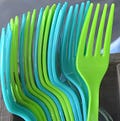








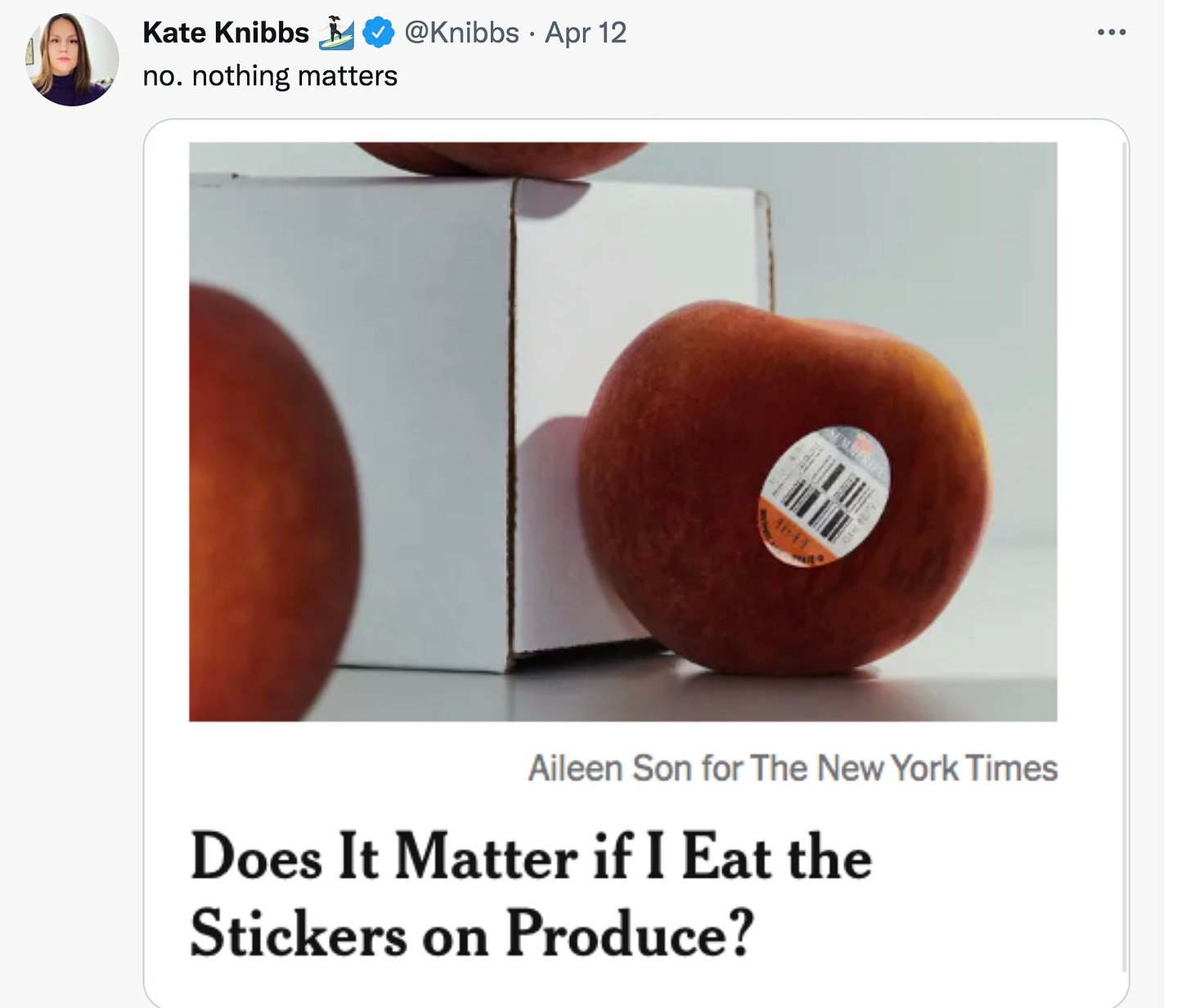


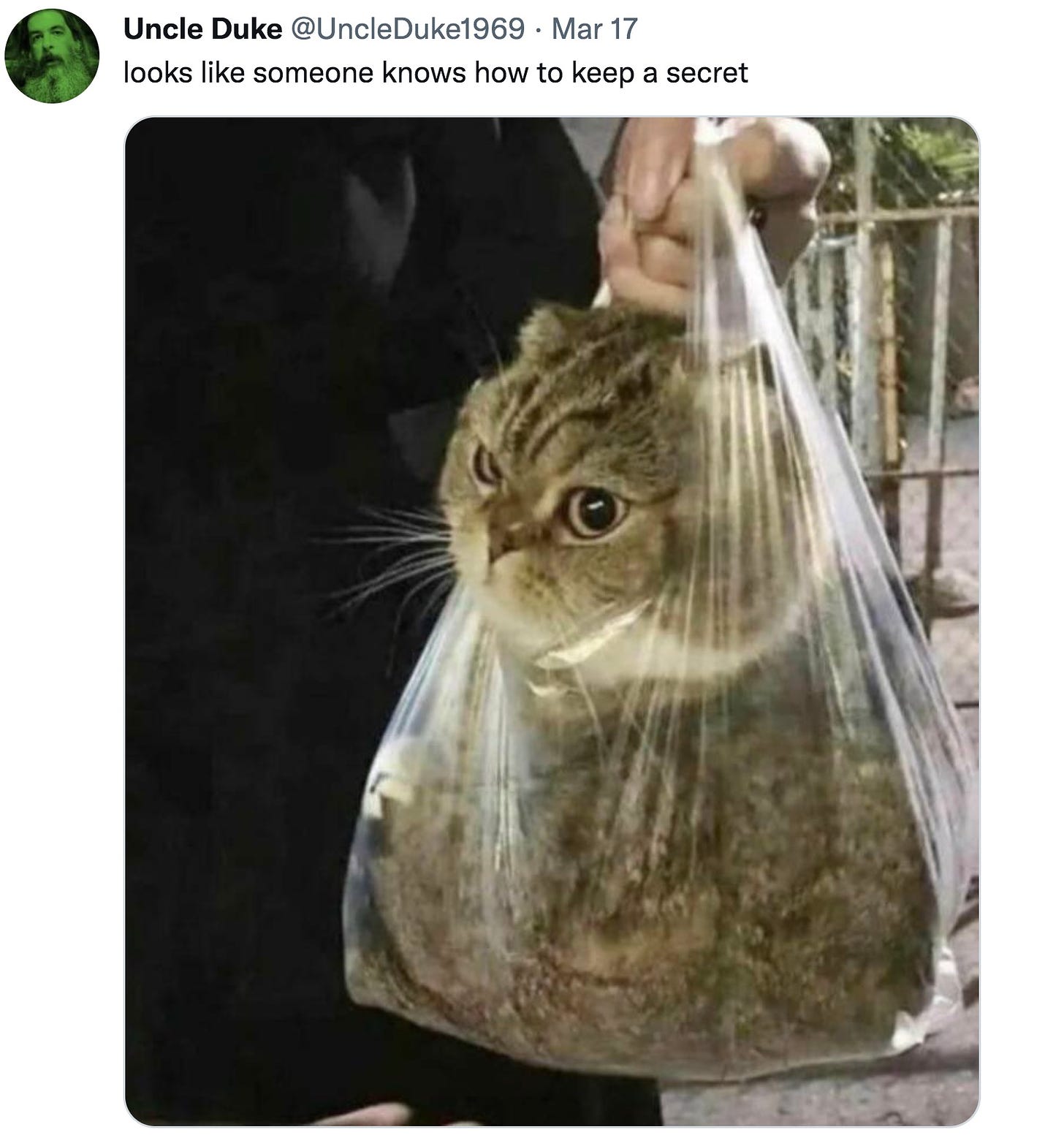

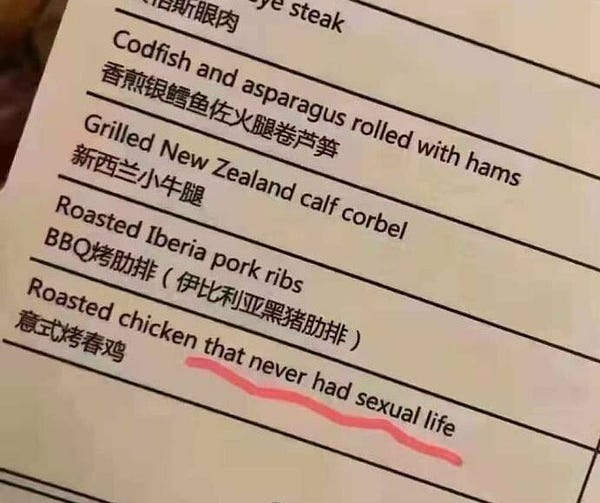
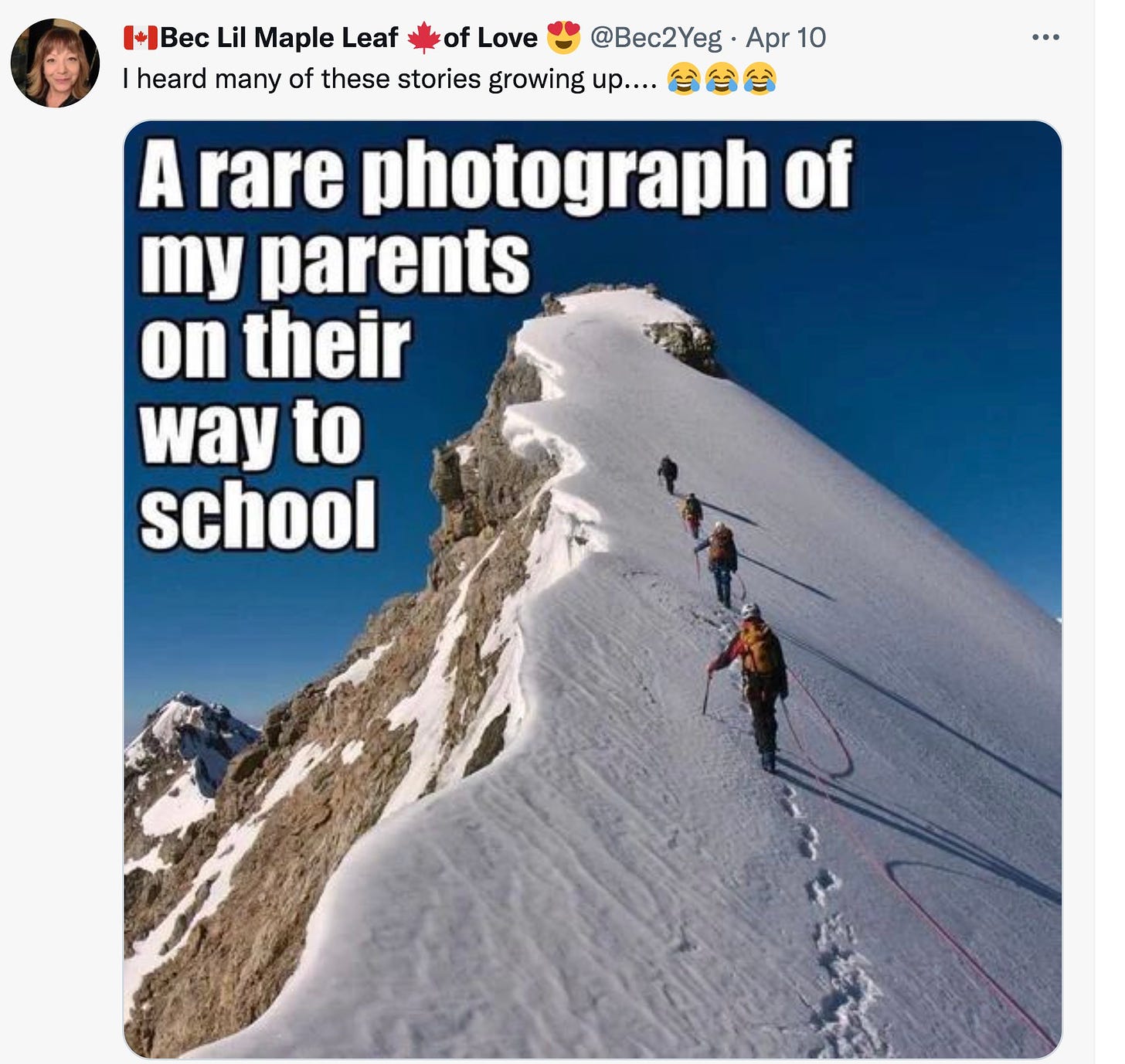

.....and let us not forget Humberto "The Savings Game" Cruz. (I voted for 8 of the 10 in the poll.)
My husband and I, also, were raised to be thrifty and always have practiced many of the small frugalities mentioned. They add up over time and repetition.
An acquaintance regularly used to make fun of my habits: "Oh, do I hear your little birdies again? -- cheep, cheep, cheep!" So guess who several times has had to come seeking a loan because he never learned to minimize spending and put aside some of his once-bountiful salary for the future? Humans haven't changed much since Aesop related "The Grasshopper and the Ant."